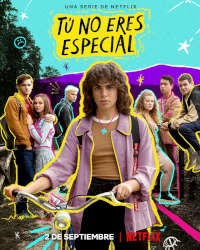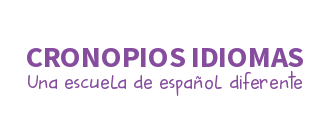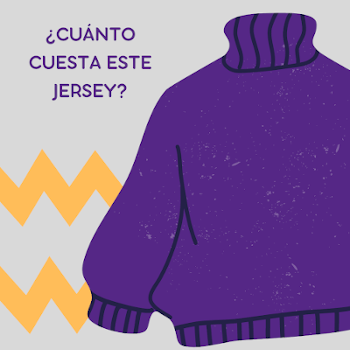Best TV Shows to Learn Spanish
From addictive telenovelas to unbelievable reality shows, Spanish speaking people are just good at conveying drama, comedy and day-to-day life through shows. To make studying Spanish easier, we have compiled a list of the best TV shows to learn Spanish. Get your favorite blanket, lay down on your couch and enjoy!
 Amaia is the main character of this funny and magical TV series where teenage daily life converges with folklore. At first, Amaia is bummed because her mom has decided to leave Barcelona and move to Salabarria, a fictional village in the region of Navarra, in the north of Spain, bringing Amaia with her. She has to adapt now to a new town, new people and worst of all: a new high school. While she is trying to face all these changes, rumors about her grandma being a witch start to spread. Amaia will uncover the truth about her ancestors, make new friends and even fall in love in this teenage comedy.
Amaia is the main character of this funny and magical TV series where teenage daily life converges with folklore. At first, Amaia is bummed because her mom has decided to leave Barcelona and move to Salabarria, a fictional village in the region of Navarra, in the north of Spain, bringing Amaia with her. She has to adapt now to a new town, new people and worst of all: a new high school. While she is trying to face all these changes, rumors about her grandma being a witch start to spread. Amaia will uncover the truth about her ancestors, make new friends and even fall in love in this teenage comedy.
We recommend it starting from an A2 or basic level, and you will find it on Netflix. Remember to add subtitles if you find it a bit hard (but in Spanish, please!).
 We do love a good passionate TV series, moreover if the story is set in the beautiful Colombian Coffee Triangle. Gaviota is a beautiful coffee picker. Sebastián, the son of Octavio, a wealthy landlord. Gaviota and her mom are planning to pick coffee beans for the last time in Octavio’s hacienda, since he has promised to provide them with an hectare of his land. However, their plans come to a standstill when Octavio tragically dies. In his funeral, Sebastián and Gaviota meet for the first time and it is love at first sight. Although attracted to each other in ways none of them can explain, their love is not meant to be due to their opposite upbringings. Drama will then unveil episode after episode, leaving you with the inescapable necessity of watching more. And anyway, how can we not recommend a show where literally everyone is astonishingly beautiful?
We do love a good passionate TV series, moreover if the story is set in the beautiful Colombian Coffee Triangle. Gaviota is a beautiful coffee picker. Sebastián, the son of Octavio, a wealthy landlord. Gaviota and her mom are planning to pick coffee beans for the last time in Octavio’s hacienda, since he has promised to provide them with an hectare of his land. However, their plans come to a standstill when Octavio tragically dies. In his funeral, Sebastián and Gaviota meet for the first time and it is love at first sight. Although attracted to each other in ways none of them can explain, their love is not meant to be due to their opposite upbringings. Drama will then unveil episode after episode, leaving you with the inescapable necessity of watching more. And anyway, how can we not recommend a show where literally everyone is astonishingly beautiful?
Ideal for people who have reached a B1 or intermediate level in Spanish. Do not forget that this series is Colombian so be ready to hear expressions from this specific variety of Spanish! You will find it on Netflix.

We bet you have heard about Cristiano Ronaldo. If you happen to live in a cave, or if football is not particularly your cup of tea, here is a quick bio: Cristiano Ronaldo is a worldwide known football player, five times winner of a Golden Ball and owner of a net worth of 500 million dollars according to Celebrity Net Worth. He has got the job, the fame and the money, and guess what? He also has the love of a Spanish lady called… yes, you guessed it well: Georgina.
In this reality show Georgina explains how she went from being an ordinary girl from Buenos Aires to a businesswoman, model and the romantic partner of Cristiano Ronaldo. Far from what you might think, Georgina will make you laugh and cry in this reality-drama that mixes luxury with the daily life of Georgina.
Recommended for speakers of A2 or more (although you will probably be amazed anyway by the daily use of their wealth without understanding a word). You will find it on Netflix.

We can assure you there is one thing happening after watching this show: you won’t be able to stop humming Aaaay Paquita, señora, niña bonita! Not only is it the main song of this TV series, but also a song performed by Rosalía long before she became the international star that she is now. The show, as the song, will live in your heart longer than you expect, considering that the series is nothing but a comedy mixed with emotional bits from the life of Paquita Salas. Paquita, a decaying manager of actors and actresses, fights for reviving the success of her business with the help of Magüi, her tender and sort of moony assistant and the few actresses that remain in her management company. Culturally embedded, Paquita Salas is perfect to approach the sense of humor of Spanish people, sometimes falling into the utter absurd, sometimes closer to tearing you up.
Taking into account the great amount of cultural references and the fluency and vocabulary used in the show, we think it would be more enjoyable for people with a C1 level in Spanish. If you are not an advanced speaker and wish to watch it anyway, don’t hesitate to press play! Subtitles are of great help and you will be able to dive into Spanish culture. You will find it on Netflix.
Learning Spanish should not mean spending hours and hours in front of a book. In fact, my students from Cronopios Idiomas and myself spent a bit of our classes recommending the Best TV Shows to Learn Spanish and discussing it. It can be fun, educational and it may let you share your opinions in Spanish. Do not hesitate and give it a go! And make sure you let us know your thoughts about these shows!






